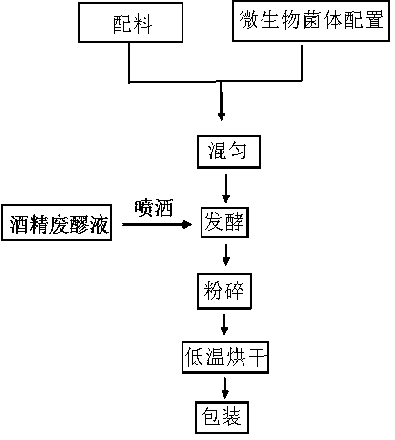Method for producing straw decomposition agent by utilizing filter mud, cassava residues and waste alcohol mash
A technology of straw decomposing agent and alcohol waste mash, which is applied in the field of microbial preparation and preparation of microbial preparations, can solve the problems of low bacterial activity, high production cost, and low enzyme production, and reduce the use of chemical fertilizers and production costs Low, wide range of effects
- Summary
- Abstract
- Description
- Claims
- Application Information
AI Technical Summary
Problems solved by technology
Method used
Image
Examples
Embodiment 1
[0021] Use Aspergillus niger to prepare microbial cells for later use, filter mud, cassava bagasse, and bagasse ash according to the weight ratio of 3:3:1, then add the prepared microbial cells and mix together, add microbial cells The amount of filter mud, cassava bagasse, and bagasse ash is 2% of the total weight of raw materials. Fermentation was started under the conditions of normal temperature and pH value of 7.0. When the temperature of the fermentation substrate rose to 50°C, the substrate was turned over and sprayed with alcohol waste mash to lower it to normal temperature and then continue to ferment. Repeat 3 times for a total of After 25 days of fermentation, it is crushed into particles with a particle size of 1 mm, and then the crushed straw decomposing agent is dried at 75° C. under normal pressure until the water weight percentage is lower than 5%. The straw decomposing agent that can be put into industrial and agricultural use can be obtained by encapsulation....
Embodiment 2
[0023] Use Aspergillus niger to prepare microbial cells for later use, filter mud, cassava bagasse, and bagasse ash according to the weight ratio of 4:4:2, then add the prepared microbial cells and mix together, add microbial cells The amount of filter mud, cassava bagasse, and bagasse ash is 4% of the total weight of raw materials. Fermentation started under the condition of normal temperature and pH value of 7.0. When the temperature of the fermentation substrate rose to 55°C, the substrate was turned over and sprayed with alcohol waste mash to lower it to normal temperature to continue fermentation. Repeat 4 times for a total of After 15 days of fermentation, it is crushed into particles with a particle size of 2mm, and then the crushed straw decomposing agent is dried at 80°C under normal pressure until the water weight percentage is lower than 5%. The straw decomposing agent that can be put into industrial and agricultural use can be obtained by encapsulation.
Embodiment 3
[0025] Use Aspergillus niger to prepare microbial cells for later use, filter mud, cassava bagasse, and bagasse ash according to the weight ratio of 3:4:2, then add the prepared microbial cells and mix together, add microbial cells The amount of filter mud, cassava bagasse, and bagasse ash is 6% of the total weight of raw materials. Start fermentation under normal temperature and pH value of 7.0. When the temperature of the fermentation substrate rises to 60°C, turn over the substrate and spray alcohol waste mash to lower it to normal temperature and continue fermentation. Repeat 3 to 5 times , after 20 days of co-fermentation, crushed into particles with a particle size of 3mm, and then dried the crushed straw decomposing agent under normal pressure at 85°C until the water weight percentage was lower than 5%. The straw decomposing agent that can be put into industrial and agricultural use can be obtained by encapsulation.
PUM
| Property | Measurement | Unit |
|---|---|---|
| relative humidity | aaaaa | aaaaa |
Abstract
Description
Claims
Application Information
 Login to View More
Login to View More - R&D
- Intellectual Property
- Life Sciences
- Materials
- Tech Scout
- Unparalleled Data Quality
- Higher Quality Content
- 60% Fewer Hallucinations
Browse by: Latest US Patents, China's latest patents, Technical Efficacy Thesaurus, Application Domain, Technology Topic, Popular Technical Reports.
© 2025 PatSnap. All rights reserved.Legal|Privacy policy|Modern Slavery Act Transparency Statement|Sitemap|About US| Contact US: help@patsnap.com

